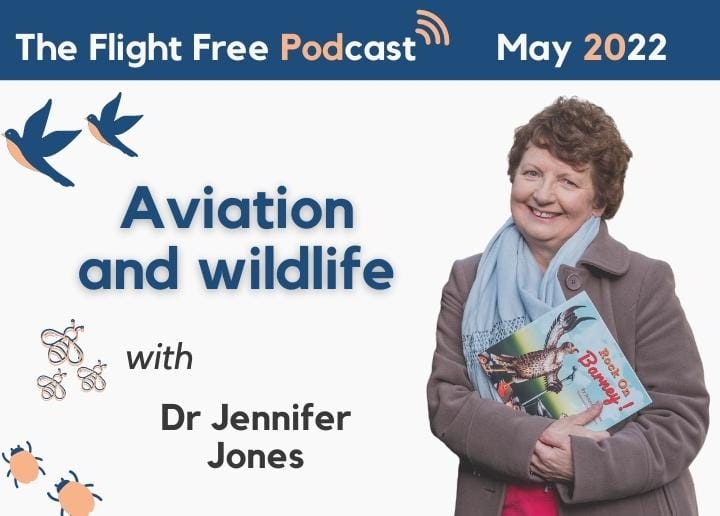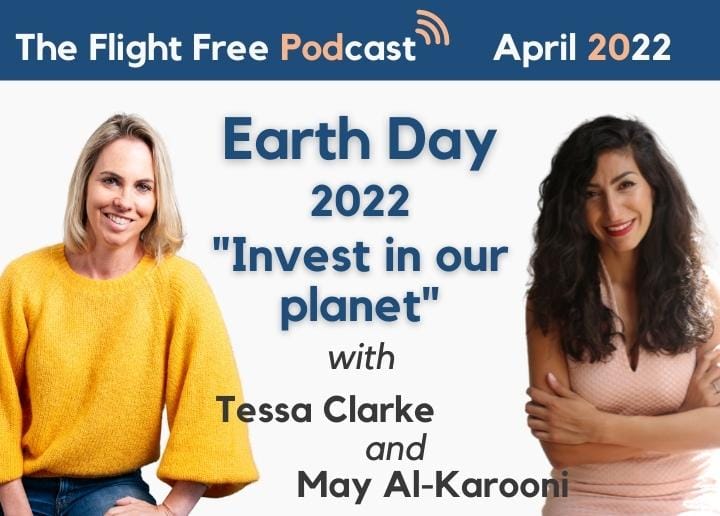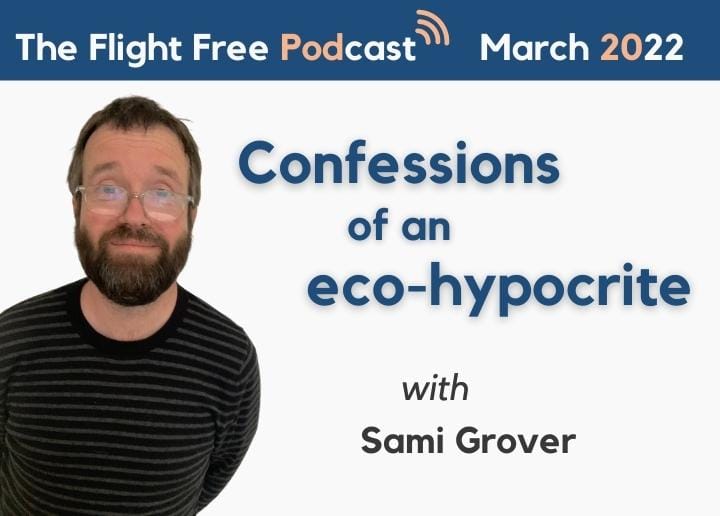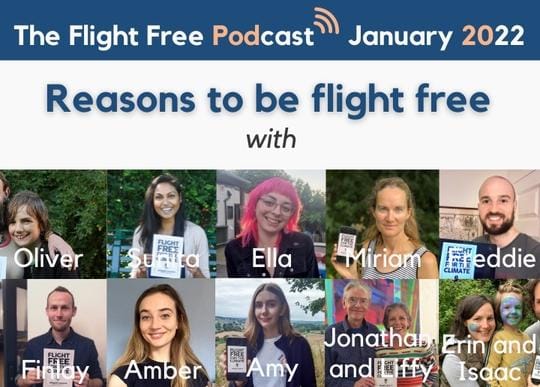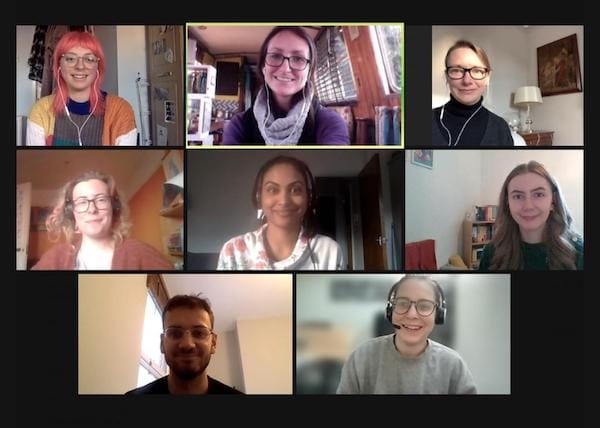This is episode 2 of our 2022 podcast series. Listen to the episode here and find other episodes and previous series here.
This month we’re talking about climate fiction, inspired by the recent film Don’t Look Up.
Our guests are filmmaker Franny Armstrong and climate scientist Peter Kalmus, who will be sharing their experiences of how telling stories through film can help inspire people to take climate action.
Flight Free Fact
Since 2000, we can find nine high-profile films whose storyline revolves around planes, including The Terminal and Sully (both starring Tom Hanks).
Over the same period, we found just two about climate: Avatar, 2009, which is about the destruction of the natural world because of man’s pursuit of the hilariously-named mineral ‘un-obtanium’, and The Day After Tomorrow from 2004, which stars Denis Quaid as a paleoclimatologist who tries to warn the world about human-induced global warming and is laughed at.
Don’t Look Up is the first film we can find that is entirely fictional and uses climate action (or lack of it) as its main theme.
First, we asked Franny and Peter, is there a particular film that has inspired them?
Franny
The film I really remember as a big moment was Michael Moore's Fahrenheit 9/11. I went to a screening in London and it was like going to a rock concert. There was just such a wicked energy and that was a big moment.
Peter
For me it was An Inconvenient Truth. One of the things I learned was you have to talk about solutions at a commensurate scale to the problem. I remember the feeling of whiplash after sitting through this film about how terrifying climate change was and then for the last frame to be “Go change your light bulbs”. It just didn't sit very well with me at that time.
In some way I was late to the party in terms of understanding how serious climate change was. I was a physics grad student at Columbia and hadn't really been thinking that much about climate change. This movie got me reading papers and learning the science and sent me on this track which eventually led me to shift from being an astrophysicist to being a climate scientist.
Flight Free UK
We asked Peter how it felt to watch himself being played out on screen by Leonardo DiCaprio?
Peter
I actually felt more affinity with the character of Kate, the grad student. You can see her struggling throughout the film with her urge to get up on the roof and start screaming. She literally does it eventually!
Some part of her knows that that's not the most skilful way to reach people, but she has such a strong emotional reaction and so much frustration at the complete lack of response of all the people around her. That's how I feel, like I'm constantly trying to rein myself in so that I don't just get completely sidelined and ignored by screaming at everybody.
We're born into this incredibly beautiful cosmic oasis, this wondrous web of life, this pale blue dot spinning through the cold void of space, and it's just marvellous. To me, life is the most wonderful thing and I feel so much gratitude to be able to have this time here on this amazing earth.
"Sometimes I can't go to sleep at night because of the irreversibility of what we're doing to the Earth’s system."
Sometimes I can't go to sleep at night because of the irreversibility of what we're doing to the Earth’s system, knowing that we’re permanently destroying so much of life on Earth and setting up this horrendous future for young people today and future generations. It all seems completely unnecessary to me.
Flight Free UK
Franny’s film The Age of Stupid stars Pete Postlethwaite as a man looking back from the future and asking, why didn't we save ourselves when we had the chance? It tells the stories of various people across the world and their responses to climate change. We asked Franny what happened once the Age of Stupid came out?
Franny
I was thinking, I've spent five years on this – this is my contribution to the fight against climate change. When it's done, I am going to retire from climate change. But when we finished the film and showed it to people, everybody said, what can I do about climate change? It slowly dawned on me that this was just the beginning.
"When we finished the film and showed it to people, everybody said, what can I do about climate change? It dawned on me that this was just the beginning."
We knew we had to do an impact campaign and eventually came up with the idea for 10:10, which was the campaign that we ran with the Guardian asking everybody to cut their emissions by 10% in 2010.
It took off massively. A third of the local councils, the government, thousands of schools, London Zoo, Royal Opera House, all these celebrities came on board to cut their emissions by 10%. That was a fantastic achievement and that campaign is still going 12 years later, although it has now become Possible.
Flight Free UK
We asked Peter and Franny what they think about getting more climate-related stories into the mainstream.
Peter
I want to see a lot more story-telling. I think one of the things that's been behind the frustratingly slow rise of the climate movement is the lack of good stories.
"One of the things that's been behind the frustratingly slow rise of the climate movement is the lack of good stories."
I think that there's been this struggle over the years to find the resonant stories. It's a completely non-trivial thing to create those good stories and it’s a skill. There are some people that are extremely good at telling stories and up until now they have been largely silent about climate breakdown.
We've been lacking in those stories and I think we need them. I really hope to see a lot more world-class stories being told in the mainstream in the near future. It's a multifaceted problem and there are an infinite number of stories. I think there are probably a few archetypal stories of which Don't Look Up represents one, but I think there are so many characters to explore.
Franny
I cannot take any more of the doom climate films! Even though they are all brilliantly made and say really important things, I just can't take it. I'm just so exhausted and demoralised by what we've done to the planet that I need to be different.
So, we came up with this idea to do a live documentary, using new technologies and live-streaming. I spoke to George Monbiot, the environmental journalist, and asked if he would do a live documentary with us. He immediately agreed and said it should be about river pollution.
We did it in July 2020 and it took river pollution from an issue that was not talked about a year before, to the front page of every newspaper and talked about in the House of Commons. There is now an investigation from the Environment Agency happening which proves that films can still change the world.
Flight Free UK
One of the benefits of story-telling and film-making is that you can make something entertaining and therefore get it in front of an audience who wouldn’t ordinarily hear that message. Don’t Look Up was really funny! It’s supposed to be entertaining – that’s the point.
We asked Franny and Peter what they thought about using comedy to explore the issue of climate change.
Franny
I think there's a lot to be said for humour. There are people doing research into this: the point at which you're laughing or just after, you're more likely to take on board a point that is counter to what you currently believe. Whether that's true or not, it definitely rings true for me and that's why we've made two climate comedies, similar to Don’t Look Up in spirit. We’re trying to communicate climate change in a different way.
Peter
I would love to see some research on this, but my feeling is that comedy is kind of like a side door into people's brains. I think these barriers go up; people cherry-pick information. Somehow comedy can get in behind all that and help people realign those different parts of their brains. Maybe they start aligning their beliefs and their actions with the actual factual beliefs that they hold. I don't know exactly how that works on a psychological level, but it makes a lot of sense to me intuitively.
"Comedy is kind of like a side door into people's brains. Barriers go up; people cherry-pick information. Somehow comedy can get in behind all that."
There are so many climate stories to be told. Don't Look Up was not a story of how we got out of this mess, but that's okay, because it was a story of where we are and it woke a lot of people up. Maybe it will lead to more climate stories that talk about solutions and solidarity, that allow us to start to feel what it would be like if society does shift into emergency mode.
Flight Free UK
Our biggest thanks to Franny and Peter for joining us this month! You can find Franny’s films at spannerfilms.net, and you can hear more from Peter at @ClimateHuman on Twitter.
Destination of the Month
Inspired by Don’t Look Up, we’ve chosen a dark sky location where you can look up and see some amazing stars. Our top destination is Kielder Water and Forest Park, officially the darkest place in England, located in the North East. With 250 square miles of stunning woodland, this really is a fantastic place to get away from the smog and gaze up at the stars above.
We hope that you’re inspired to make 2022 your year of being flight free. You can sign up at flightfree.co.uk, and don’t forget to share the pledge with your friends and family to help us spread the word.
Next month we’re speaking to Sami Grover about how individual climate action relates to system change. See you then!
This is episode 2 of our 2022 podcast series. Listen to the episode here and find other episodes and previous series here.
Credits:
Episode produced by Eveline Vouillemin and narrated by Louise Millington and Eveline Vouillemin. Intro music: The Executive Lounge By Dan Barton. Outro music: Pines and Violet by Sky Toes.
